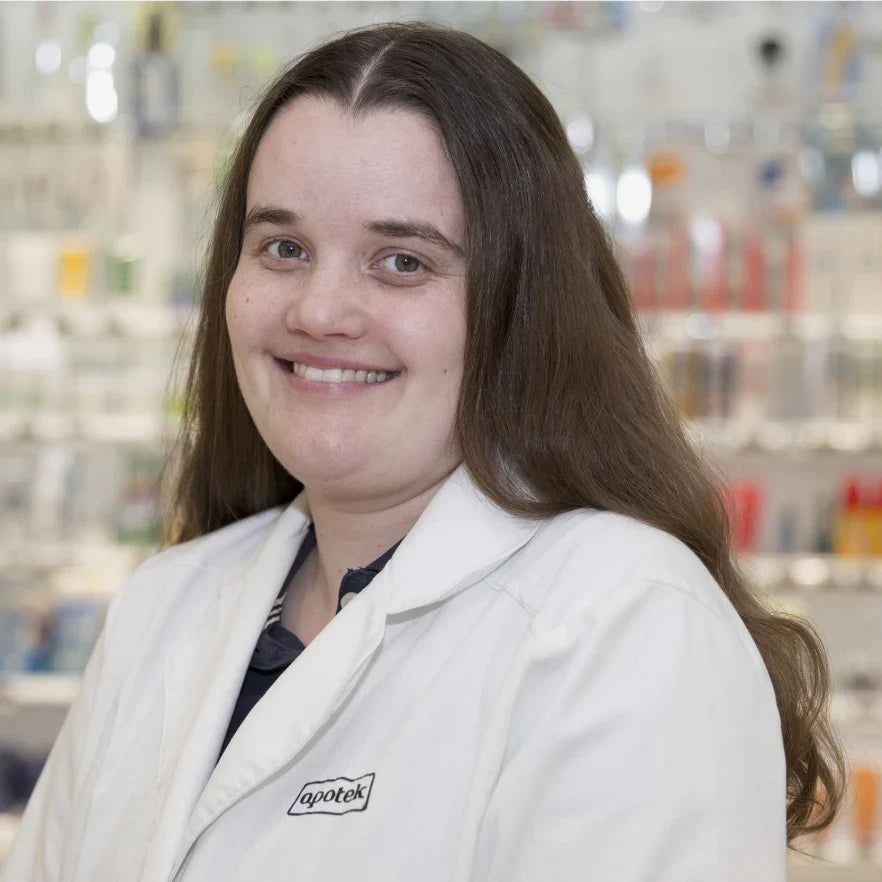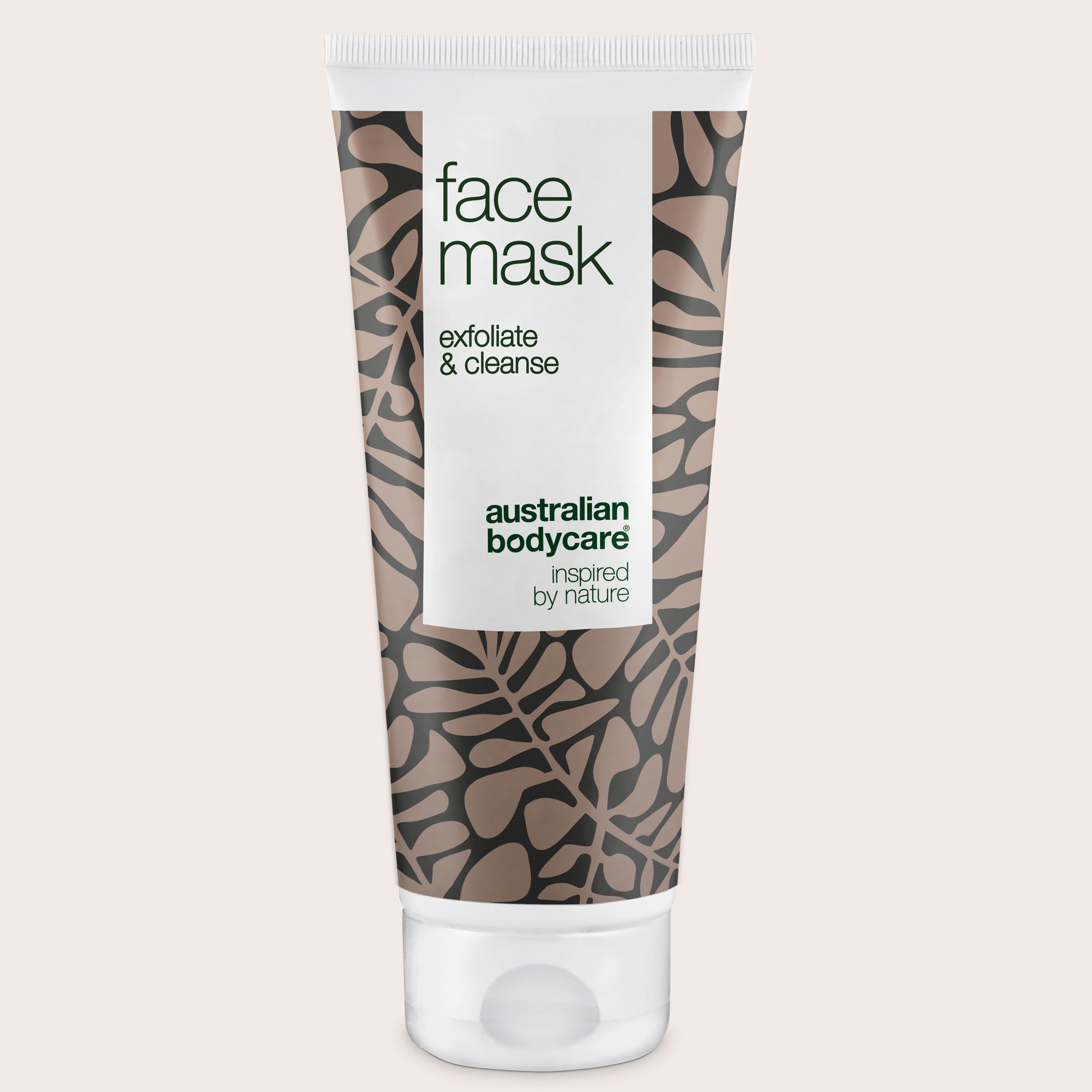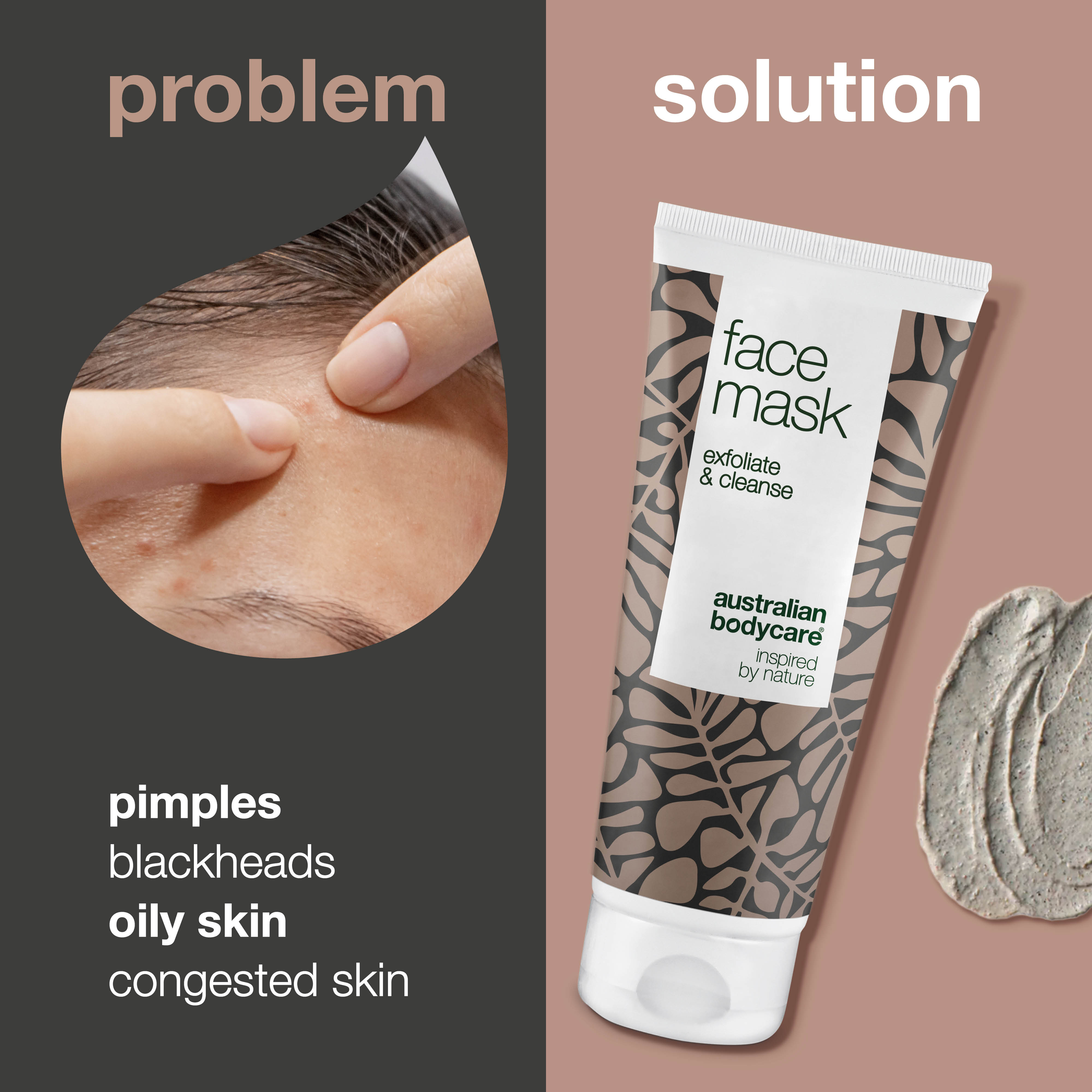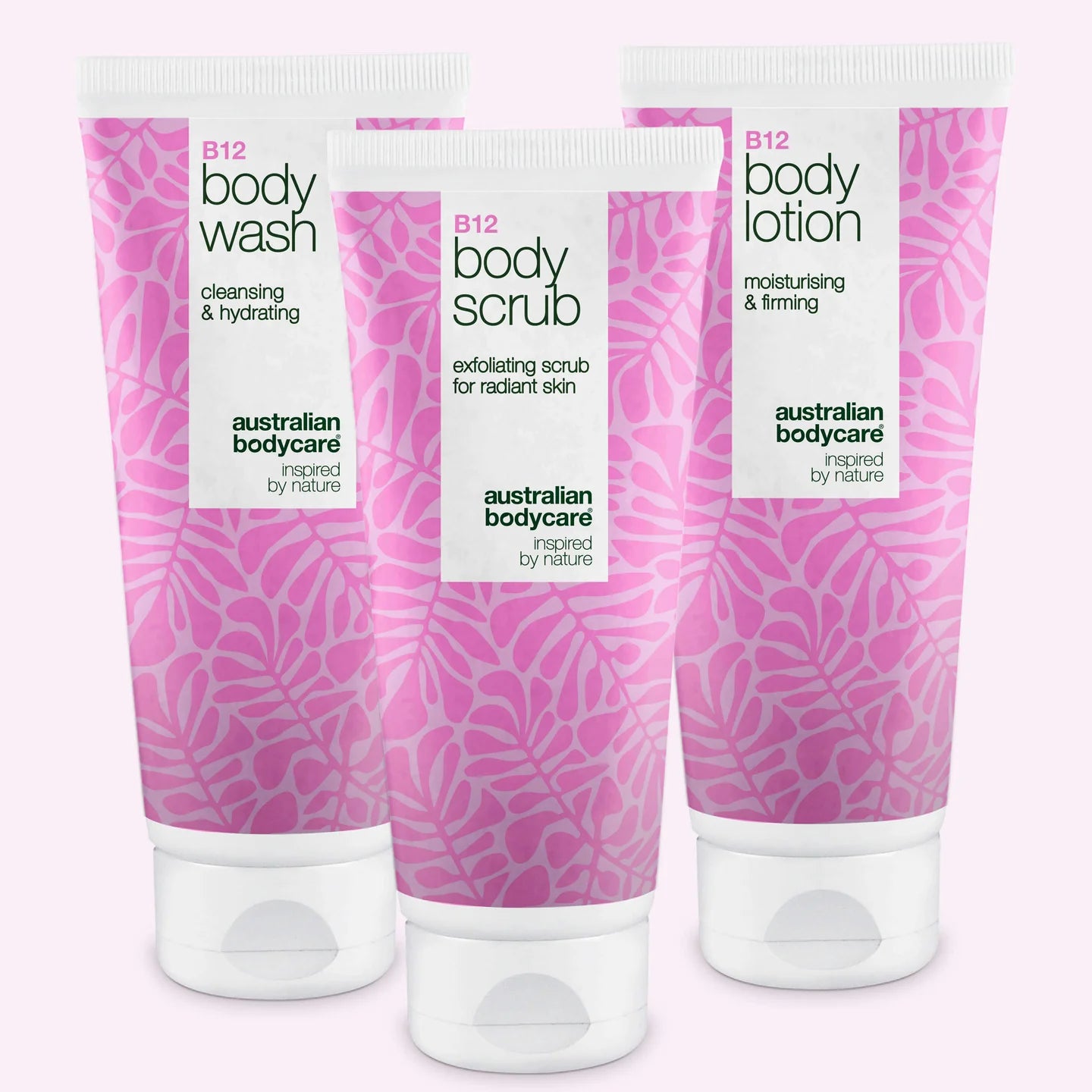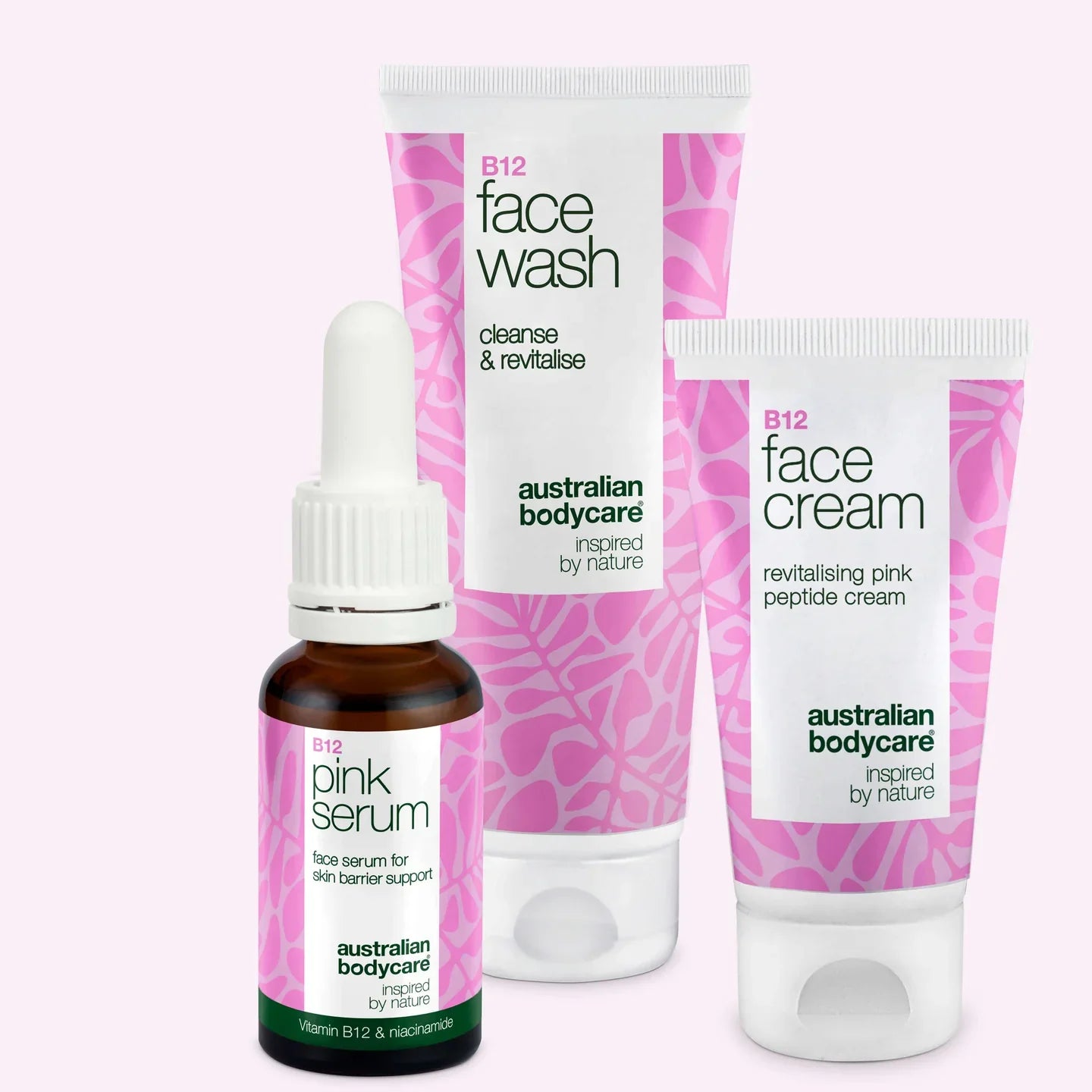Blemished skin – How to reduce pimples and dry skin
Table of contents
What is blemished skin?
Impure skin is also called acne, or Acne Vulgaris in Latin. When you have blemished skin, the skin becomes shiny and white or black blackheads (also called comedones), red bumps or pimples with yellow pus form. This can be on the face, but it can also occur elsewhere on the body. For example, on the back, upper arms, chest and other parts of the body. The places where we have the most sebaceous glands.
Impure skin is caused by an overproduction of sebum, which leads to clogging of the sebaceous glands. If bacteria enter the sebaceous gland, inflammation can occur, leading to impure skin. Everyone produces sebum, but in some people there is an imbalance in sebum production, which occurs because the skin is either too oily or too dry. If the skin is oily, the cause is an overproduction of sebum - which may be due to a hormone imbalance.
On the other hand, if you have dry skin, the skin will try to compensate for the dry skin by also increasing the production of sebum and this also leads to the risk of overproduction of sebum and thus the risk of impure skin. The solution to this is to keep the skin clean, remove excess oil and moisturise the skin with a good face cream for blemished skin.
Pimples and blemishes often affect young people during puberty, but they can also occur at other times in life, for example, women are often affected by hormonal changes, such as when they stop taking the contraceptive pill or during pregnancy. But it can affect both sexes, for example in the context of stress.
Anyone can be affected by blemished skin
Impure skin often appears on the face, and this is where it is particularly bothersome because it is visible to everyone. You can't cover it up and hide it, as you can to a greater extent if you have impure skin elsewhere on your body.
But no matter where the blemishes appear, they are annoying and irritating.
Impure skin, both on the face and on the body, is very common, especially among teenagers. And it affects both girls and boys, women and men. For most people, it goes away after a few years, for others it lasts longer, and some never really get rid of the problem.
So, impure skin is not just a teenage phenomenon. Many adults suffer from impure skin throughout their lives.
How do you remove impure skin? A step by step guide
This is how you use Face Wash for impure skin:
Step by step guide:
1: Apply the soap to the blemished skin of the face.
2: Massage lightly.
3: Rinse the face with lukewarm water
4: Repeat every morning and evening
5: Then you can apply face tonic, blemish serum and face cream for extra care to the skin.
Face Wash from Australian Bodycare is a mild antiseptic face wash for impure skin with Tea Tree Oil that removes impurities from the skin and keeps the skin healthy. Face Wash maintains the skin's natural moisture balance.
Results after 4 weeks use of the kit:


Also read: How to use a Face Mask for blackheads
Read more: How to get rid of impure skin and blackheads
Blemished skin can affect your mental health
Impure skin is not just a skin condition; it can also cause problems on other fronts. For many people, impure skin affects their mental health and causes self-esteem issues. That's why it's so important to do something about it, which is absolutely possible. Read more about treatment and prevention later in this article.
Why are some people blessed with perfect skin?
While some people escape pimples and blemishes completely, both in their teenage years and later in life, others are severely affected. It is not known for sure why some people are affected and others are spared.
There is no doubt that blemished skin is hormonal in nature. In addition, lifestyle and the use of creams and make-up can also play a role. And finally, your genes play a role. There are simply some families that are more affected by blemished skin than others. So to some extent, blemished skin is a hereditary thing.
Most people will experience a single pimple at some point, but anyone who has been seriously affected by impure skin and pimples knows that there is a world of difference between the feeling of a single small pimple once in a while and daily massive pimple attacks on the face and body.
What are pimples?

Pimples are a hormonal skin condition. When extra hormones are produced, for example during puberty, this also means that extra sebum is produced in the hair follicle or sebaceous gland. The hair follicle becomes blocked, the sebum cannot get up to the skin and out, so the sebum stays in the hair follicle - forming a blackhead.
When a blackhead develops into a pimple, it is caused by bacteria. If bacteria get into the blackhead, it will develop into a red and swollen pimple filled with yellow pus.
> Anti-pimple products that remove the bacteria that cause pimples.
What are blackheads?
A blackhead is the first step towards a pimple. A blackhead is actually a clogged sebaceous gland or hair follicle caused by an overproduction of sebum.
Blackheads are caused by clogged hair follicles or sebaceous glands, which is caused by an overproduction of sebum, which can either be due to oily or dry skin. Overproduction of sebum can also be caused by hormones, which is why impure skin is often affected during puberty. But it can also happen later in life.
Blemishes on the face
Impure skin often appears on the face. It can be on the forehead, on the nose, on the chin or elsewhere; and perhaps all at once. It is difficult to hide on the face, which is why it is extremely annoying to have impure skin here. The forehead, nose and chin form a T-shape on the face, which is why this area is often referred to as the T-zone.
Read more about impure skin on the face here.
ALSO READ: How to treat pimples on the face
Pimples on the forehead
For some people, the blemished skin on the face appears only in certain areas, such as the forehead, while for others, the whole face is affected.
If you often get pimples and blemishes on your forehead, it's not surprising because the forehead is part of what is known as the T-zone. The T-zone is the area of the face where the skin is most prone to oiliness. This is why it is also where blemished skin is most common. The T-zone extends across the forehead, down over the nose and to the chin.
Pimples on the nose
The nose is often the place where blackheads, known as comedones, are most common. They form here because the nose and the area on either side of the nose tend to become oily during the day.
The nose, together with the forehead and chin, forms the so-called T-zone of the face. This is the area of the face where the skin is the most oily.
A blackhead remover can be effective in removing blackheads - read more here
Pimples on the chin
If you have pimples on the chin, it can be very bothersome as it can be very difficult to hide. While pimples on the forehead can often be covered with the bangs, it is much more difficult to hide if you are affected by pimples in the lower part of the face, for example the chin or nose.
However, it is also this part of the face that is most often affected by hormonal changes. Therefore, you can often find an explanation if you have pimples on your chin. In women, this is often linked to the monthly cycle, but it can also be affected by stress.
Impurities on the rest of the face
Although most cases of blemishes and pimples occur in the T-zone, you can have pimples anywhere else on your face too. It can be on the cheeks and temples, and it can be in the ears and down the neck.
Pimples on the scalp
Impure skin often occurs where the skin is most oily. It can be on the face, it can be on the body, but it can also be on the scalp.
When we talk about oily hair, it is actually the scalp that is oily due to an overproduction of sebum in the hair follicles. And when the scalp is oily, it is also a breeding ground for pimples and impure skin on the scalp as well as on the rest of the body.
ALSO READ: Pimples on the scalp - How to treat them
Pimples on the body
It is very common to have impure skin on the body. Often it is the back that is affected, but it can also be the chest, upper arms and shoulders. And pimples on the legs and bum are certainly not uncommon either.
Impurities on the back
If you are one of those who suffer from pimples and impure skin on the face, it is very likely that you also experience pimples on your back; either constantly or occasionally.
The cause of pimples and impure skin on the back is the same as the cause of impure skin and pimples on the face and everywhere else. Namely, the skin produces too much oil, which then clogs the pores in the skin. This causes inflammation, which leads to pimples on the skin.
READ MORE: Unclean skin on your back - How to clear up your skin again
How to prevent blemishes
You can't control whether you get blemished skin or not. But you can do a lot to treat your blemished skin to get rid of it, and you can do a lot to prevent it from coming back.
There are many myths and stories about pimples and blemished skin. One of them is that eating fatty and spicy foods, chocolate and crisps will give you blemished skin and pimples. Another recurring question is whether milk has an influence on blemished skin, and in this area there may actually be reason to do some research.
To conclusively conclude that there is a link between impure skin and milk, more research is needed, but it may be worth trying to cut down on dairy products for a period of time if you suffer from impure skin. Apart from milk, there is no research that suggests that you get blemished skin from your diet. So a change in diet won't help much. The right skincare regime, on the other hand, can quickly make a big difference.
Skincare for blemished skin
Taking proper care of your skin can mean the difference between blemished skin and clean skin. First and foremost, it's all about keeping your skin clean. You can do this by making sure you wash your face twice a day - every single day. Lukewarm water and a good face wash are the key ingredients in the fight against blemished skin. It's important to make sure the water is lukewarm. Your skin will be irritated if the water is too hot or cold, and this will result in your skin producing extra sebum and start a vicious circle in the fight against your blemished skin.
If you have blemished skin anywhere other than your face, the same rule applies: Make sure you keep your skin clean to remove excess oil. Even if your skin feels oily, it's important not to cleanse so much that your skin becomes dry. And never scrub your skin. Your skin still needs moisturising, even if it is blemished and feels oily. So it's important to use a good face cream for pimples or a body lotion for blemishes to keep your skin healthy. The face cream should be one that is suitable for blemish-prone skin, is light and does not clog pores. It's best to use a cream that effectively fights bacteria throughout the day.
ALSO READ: Tea Tree Oil - natures weapon for impure skin
ALSO READ: Efficient kit for impure skin and pimples
Face mask for blemished skin
There are many different face masks for impure skin that are made specifically for impure skin. You will have to experiment until you find one that works for you.
A homemade face mask is also an option. It's a somewhat cheaper alternative, and actually not as difficult to make as it sounds. You can find many different recipes for homemade face masks online.
Many people also use exfoliation to combat blemished skin. It's an effective beauty treatment that removes dead skin cells and cleanses pores. Find out how to exfoliate your skin here.
Severe cases of blemished skin
For particularly severe cases of impure skin, or acne, you may need to see your GP or a dermatologist. They may be able to provide you with remedies for acne or remedies for blemished skin. If you are a woman, contraceptive pills may also be an option. Often contraceptive pills can have a beneficial effect on blemished skin.
Smoking and blemishes
Smoking is a bad habit for many reasons, and when you smoke, your skin is also affected. It becomes coarser, greyer and less elastic.
So the prospect of more beautiful skin is another good reason to give up cigarettes. However, many people find that they have more blemished skin and many more pimples for a few weeks after giving up cigarettes. This is because the body has to get rid of a lot of waste products, which also affects the skin. But don't worry: it will get better after a while.
Blemishes during pregnancy
When you become pregnant, your body undergoes a wide range of hormonal changes. One of the consequences is that the mum's skin is often affected when a new baby is on the way. This is a natural process that will change again after the birth. The best tip is to keep your skin clean and moisturised as usual and to drink plenty of water.
7 myths about blemished skin
Myth 1: Chocolate gives you pimples
There is no research to prove that diet plays a major role in the development of blemished skin and acne. There are those who claim that too much chocolate can cause acne. Conversely, there are others who claim that dark chocolate can help with acne. There is insufficient evidence for either of these claims.
Myth 2: Chips and fatty foods cause pimples
There is no evidence that unhealthy foods such as crisps and fatty foods can cause more pimples. If you eat unhealthy food in extreme amounts, it might have an effect. But if you eat mostly healthy and only a little unhealthy food every now and then, there is no evidence that it affects your skin.
Myth 3: Impure skin is infectious
Impure skin is not contagious. The bacteria found in pimples and blemishes is not a bacteria that you can infect others with. So this is a myth that can be quickly dispelled.
Myth 4: Pressing pimples causes more pimples
It's a myth that is partly true and partly false. It can be very difficult to keep your fingers away from a pimple or blackhead that is ready to be squeezed out. If you do it gently, preferably with a clean piece of paper, you can often get away with doing it without damaging the skin. But you can also risk causing more inflammation and scarring the skin. Always remember to wash your hands before and after to prevent the bacteria from spreading. But if you can avoid picking, that's a good idea. Clean your skin instead - it's much more effective.
Myth 5: Tooth paste helps with pimples
Toothpaste is essential for good dental and oral hygiene, but keep it in your mouth. It's a persistent myth that toothpaste can help fight pimples by drying them out. Instead of fighting the pimple, you risk irritating the skin unnecessarily and end up with redness and irritation. So using toothpaste on your skin is not a good idea - and it won't help with pimples and blemishes.
Myth 6: Makeup causes blemishes
You won't get blemished skin from makeup, as long as you make sure you use good products that don't contain oil and thus add more oil to your skin. However, it's important to keep your skin clean and healthy underneath your make-up - so the daily routine of face wash, skin tonic and a good bacteria-fighting cream, both morning and night, is fundamental to avoiding blemished skin.
Myth 7: Stress causes blemishes
It's true that long-term stress can affect the skin, just as stress affects the mind and body in general. But having a skin condition like blemished skin is also stressful and reduces your quality of life, so there are many good reasons to do something about your blemished skin.
FAQ about impure skin
Why does one get blemished skin?
Impure skin is caused by an overproduction of hormones, which then leads to clogged sebaceous glands (or pores) in the skin, increased sebum production and bacteria in the skin. Impure skin often affects young people during puberty, but can occur at any age.
How do get rid of blemished skin?
The best thing to do when you have blemished skin is to wash and cleanse your face twice a day to remove oil and dirt from your skin. It is important to use special products that are specially formulated for blemished skin. Cleanse with a mild face wash to remove unwanted bacteria and use a face cream afterwards.
What does impure skin on the chin mean?
Impure skin often occurs in the so-called T-zone of the face. It is in the forehead, nose and chin where the skin is most prone to oiliness. The lower part of the face, and in particular the chin, is particularly affected by hormonal changes. Therefore, women will often have a tendency to have impure skin on the chin in connection with their monthly cycle or other hormonal imbalances. On the chin in particular, blemished skin can also be aggravated by sitting and resting the chin against a dirty hand.
What can help you with dry and oily skin?
The best remedy for dry and oily skin is to keep your skin clean. To do this, wash and cleanse your skin twice a day with a special face wash that removes unwanted bacteria and excess oil. Even if your skin is oily and blemished, it can still be dry in some areas, so it's important to use a cream that suits your skin type.
What is efficient for impure skin?
In the fight against impure skin, regular cleansing is your best weapon. The best thing you can do for your skin is to cleanse your skin twice a day to remove excess oil, dirt and unwanted bacteria. Then, you should deep cleanse your pores with an antibacterial skin tonic. To avoid irritating the skin, it is important to use a skin tonic that does not contain alcohol. Finally, remember to moisturise and nourish your skin with a special cream for impure skin. This way, you can prevent and treat blemished skin at the same time.
Why do I get blemished skin on the back?
Impure skin can appear anywhere on the body. Most often, it will be where the skin is most prone to oiliness. On the face, scalp, upper arms, chest and back. So it is quite normal to get blemished skin on your back.
Can contraceptives help with my blemished skin?
Yes, there is actually research that shows that in many cases, the contraceptive pill can have a beneficial effect on blemished skin. If you are severely affected by blemished skin, this may be a solution. Talk to your doctor about the possibility of taking contraceptive pills for blemished skin.
What is blemished skin?
Blemished skin is blackheads (also called comedones), red bumps or pimples with yellow pus. Impure skin can appear anywhere on the body, but it is most common on the face, back, upper arms and chest. Where the skin is particularly prone to oiliness.
What causes impurities on the neck?
Impure skin on the neck occurs for the same reason as impure skin elsewhere on the body: extra sebum is produced in a hair follicle or sebaceous gland. The hair follicle becomes blocked, the sebum can't get up to the skin and out, so the sebum stays in the follicle - forming a blackhead or pimple.
How do you cover up impure skin?
Impure skin is annoying and uncomfortable. And while you may be able to cover the blemishes on your body, blemishes on your face can be tricky. Here, the best remedy is to use a concealer that is specifically designed for blemished skin - and may even treat as well as cover.
When will the blemishes go away?
For the vast majority of people, blemished skin disappears once they have gone through puberty. However, some people continue to suffer from blemished skin even after puberty
Can Fish oil cause blemishes?
There is no evidence to suggest that diet has a major influence on impure skin. Major dietary changes may have an impact, but the consumption of individual foods, such as fish oil, is not what causes blemished skin.
Can coffee cause impure skin?
Coffee does not cause impure skin. In general, there is no single food that causes blemished skin. So avoiding certain foods does not help.
Can stress cause skin impurities?
Stress affects you both mentally and physically, and stress can also affect your skin to some extent, making it more impure than usual. If you suddenly start to develop blemished skin, it may therefore be a good idea to look at how you live in general.
Can blemished skin be a sign of pregnancy?
Impure skin is most often associated with hormonal changes. This is why impure skin often affects young people during puberty - and why you may also experience impure skin during pregnancy. However, the sudden onset of blemished skin can be caused by many things other than pregnancy.
Can blemished skin be contagious?
Impure skin is not contagious. The bacteria found in blemished skin are not bacteria that can be passed on to others. So you don't have to worry that you can infect others with your blemished skin - and there is no reason to worry that others with blemished skin can infect you.
